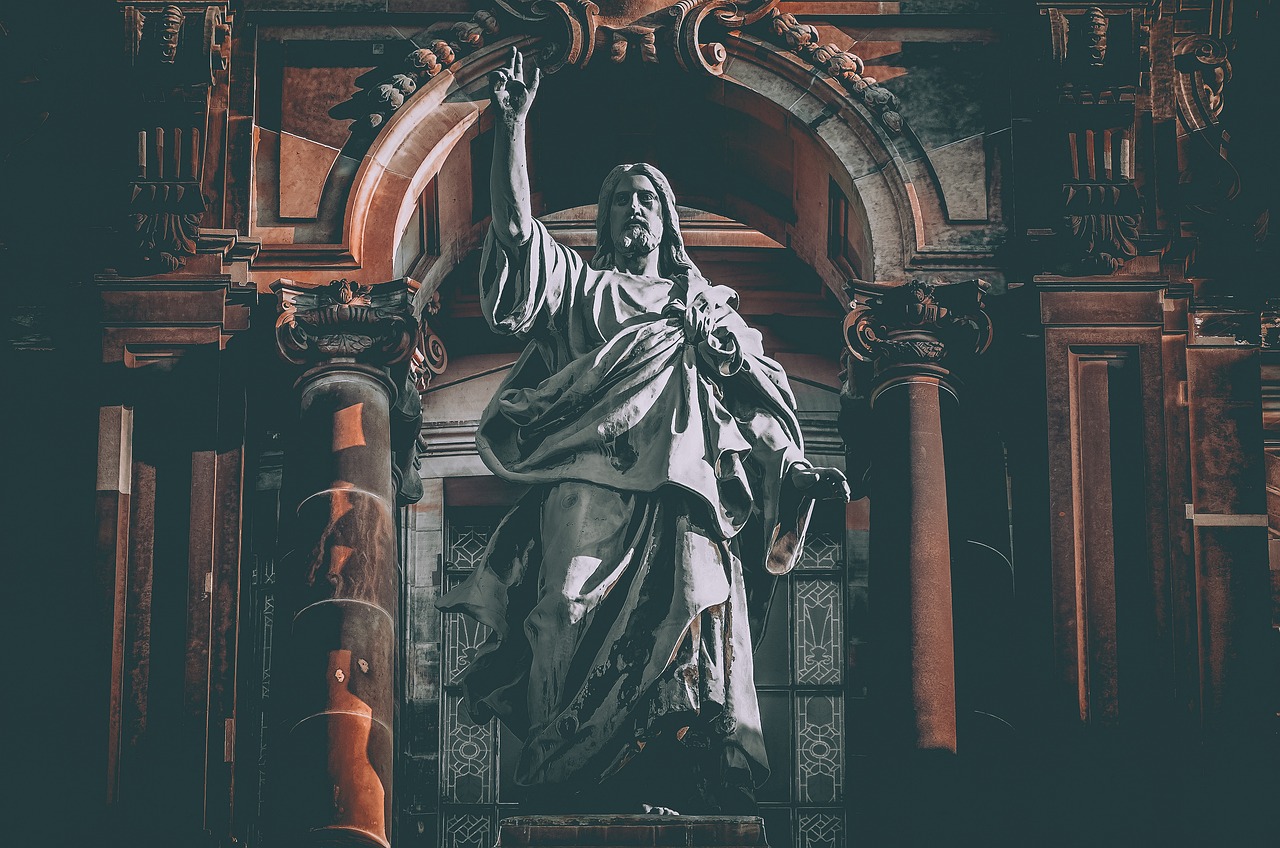Imagine a fascinating journey through time, exploring the roots of two ancient religions. In the vast tapestry of human history, the questions emerge: Is Hinduism older than Christianity? Delving into the annals of religious practices and beliefs, this article seeks to uncover the vibrant histories of both faiths, shedding light on their origins, development, and the remarkable parallel paths they have tread upon the Earth. Embark on this enlightening exploration and discover the awe-inspiring interconnectedness of religions that have shaped our world.
Table of Contents
Introduction
Welcome to this comprehensive article comparing the origins, timelines, historical evidence, beliefs, major scriptures, ancient philosophies, and evolution of two major religions – Hinduism and Christianity. In this friendly and informative article, we will explore the rich histories and distinctive characteristics of these religions, providing a deeper understanding of their roots and practices. So, let’s dive in!
Origins of Hinduism
Indus Valley Civilization
Hinduism has its roots in one of the world’s oldest civilizations, the Indus Valley Civilization, which thrived around 2500 BCE in the region of present-day India and Pakistan. Although the exact religious practices of this ancient civilization are not fully known, archaeological evidence suggests the presence of early forms of worship and deity reverence.
Pre-Vedic Period
The Pre-Vedic period, roughly from 2000 BCE to 1500 BCE, laid the foundation for Hinduism. During this time, the indigenous peoples of the Indian subcontinent worshipped various deities, spirits, and natural forces. The religious practices of this era were primarily centered around fertility, worship of ancestors, and nature.
Vedic Period
The Vedic period, which began around 1500 BCE, is crucial to the development of Hinduism. The collection of sacred texts known as the Vedas emerged during this time, serving as the earliest religious scriptures in Hinduism. Vedic rituals, hymns, and sacrifices played central roles in the religious practices of this period.
Post-Vedic Period
Following the Vedic period, Hinduism underwent significant transformations, influenced by various cultural and philosophical movements. The Upanishads, composed between 800 BCE and 200 BCE, explored deeper spiritual and philosophical concepts, such as the nature of reality, the self, and the ultimate truth (Brahman). This period also witnessed the rise of different philosophical schools like Vaishnavism, Shaivism, and Shaktism, which contributed to the diversity within Hinduism.

Origins of Christianity
Birth of Jesus
Christianity traces its origin to the 1st century CE, with the birth of Jesus Christ in Bethlehem. According to Christian belief, Jesus was the Son of God, sent to Earth to redeem humanity from sin. His teachings emphasized love, forgiveness, and salvation through faith in him.
Early Christian Communities
After Jesus’ crucifixion and resurrection, his disciples and followers formed early Christian communities. These communities spread throughout the Roman Empire, primarily in the Eastern Mediterranean, with centers such as Jerusalem, Antioch, and Alexandria.
Spread of Christianity
Christianity gained momentum and spread further through the missionary efforts of the apostles and early Christian leaders. The conversion of Emperor Constantine to Christianity in the 4th century CE marked a significant turning point, as Christianity became the official religion of the Roman Empire, leading to its rapid expansion across Europe and beyond.
Timeframes
Hinduism’s timeline
Hinduism’s timeline can be traced back to the Indus Valley Civilization around 2500 BCE. The religion began to take shape more definitively during the Vedic period (1500 BCE to 500 BCE) and continued to evolve through subsequent centuries.
Christianity’s timeline
Christianity’s timeline starts with the birth of Jesus around the 1st century CE. The early Christian communities emerged in the same period, and the religion expanded rapidly following the conversion of Emperor Constantine in the 4th century CE.

Historical Evidence
Archaeological findings
In terms of archaeological evidence, the Indus Valley Civilization offers valuable insights into the early religious practices that eventually shaped Hinduism. Excavations have revealed artifacts like seals and sculptures depicting possible deities or religious rituals. However, the lack of decipherable texts makes it challenging to draw definitive conclusions.
Literary sources
Both Hinduism and Christianity have rich literary sources that provide historical insights. Hinduism’s texts, such as the Vedas, Upanishads, Mahabharata, and Ramayana, offer a detailed understanding of the religion’s development and practices. Similarly, the Christian Bible, comprising the Old Testament (Hebrew Scriptures) and the New Testament (teachings of Jesus and early Christian writings), serves as a fundamental source for understanding Christian origins and beliefs.
Religious texts
The religious texts of Hinduism and Christianity play essential roles in shaping their respective faiths. Hinduism encompasses a vast array of scriptures, including the Vedas, Upanishads, Bhagavad Gita, and Puranas, which guide the spiritual and ethical aspects of Hindu life. Christianity relies on the Bible, which contains various books, including the Four Gospels, Epistles, and the Book of Revelation, providing teachings and moral guidelines for Christians worldwide.
Beliefs and Doctrines
Hinduism
Hinduism is a diverse religion with a multitude of beliefs and doctrines. Central to Hinduism is the belief in Dharma, the moral and ethical duties that govern one’s actions. Hinduism also embraces the concepts of Karma, the belief that actions have consequences in one’s present and future lives, and Moksha, the ultimate liberation from the cycle of birth and death. Additionally, Hindus hold various beliefs in the multitude of deities and the interconnectedness of the universe.
Christianity
Christianity revolves around the belief in one God, who is revealed as the Holy Trinity – the Father, the Son (Jesus), and the Holy Spirit. Christians believe in the divinity of Jesus Christ, his crucifixion, resurrection, and eventual return. Core doctrines include salvation through faith in Jesus, the sacraments (such as baptism and communion), and the importance of love, forgiveness, and eternal life in the presence of God.

Major Scriptures
Hindu scriptures
Hinduism encompasses a vast body of scriptures, known as the “Holy Vedas.” The four primary Vedas – Rigveda, Samaveda, Yajurveda, and Atharvaveda – are ancient texts containing hymns, rituals, and philosophical insights. The Bhagavad Gita, a revered Hindu scripture, offers guidance on spirituality and righteous living. Other key texts include the Upanishads, Ramayana, and Mahabharata.
Christian scriptures
The Christian scriptures consist of the Bible, divided into the Old Testament and the New Testament. The Old Testament, also known as the Hebrew Scriptures, contains religious texts and historical accounts preceding the birth of Jesus. The New Testament focuses on the life, teachings, death, and resurrection of Jesus Christ, serving as the foundation for Christian theology and moral teachings.
Ancient Philosophies
Hindu philosophies
Hinduism encompasses a wide range of philosophical schools, each offering unique perspectives on reality, existence, and the self. Philosophies like Vedanta, Yoga, and Samkhya explore concepts such as non-duality, self-realization, and the nature of consciousness. These philosophies provide frameworks for deeper spiritual contemplation and self-discovery.
Christian philosophies
Christianity’s ancient philosophies revolve around the interpretation and application of biblical teachings. The works of early Christian theologians, such as St. Augustine and St. Thomas Aquinas, reflect philosophical inquiries into morality, ethics, and the nature of God. Christian philosophy explores concepts like free will, the problem of evil, and the relationship between faith and reason.
Evolution and Influences
Hinduism’s evolution
Hinduism has evolved over thousands of years, absorbing and incorporating diverse cultural practices and beliefs. It has been shaped by interactions with various religious traditions, including Buddhism and Jainism. As a result, diverse sects and schools of thought have emerged within Hinduism, each emphasizing different deity worship, rituals, and spiritual practices.
Christianity’s evolution
Christianity has also evolved over time, influenced by different cultures, geographical regions, and theological debates. Various denominations and sects with distinct practices and interpretations of scripture have emerged, such as Catholicism, Protestantism, and Eastern Orthodoxy. The Reformation in the 16th century brought significant changes, leading to the development of numerous Protestant traditions.
Influences on Hinduism
Hinduism has been greatly influenced by its interactions with other cultures and religions. The arrival of Islam to the Indian subcontinent introduced new ideas and practices, impacting Hindu architecture, literature, and social customs. Additionally, British colonial rule in India brought Western influences that shaped the way certain Hindu practices and beliefs were understood and interpreted.
Influences on Christianity
Christianity has encountered various external influences throughout its history. The spread of the religion across different regions led to its integration with local customs, rituals, and beliefs, resulting in the development of regional variations of Christianity. Furthermore, early Christian theologians drew from ancient Greek philosophy and thought to articulate Christian doctrines.
Comparative Practices
Rituals and ceremonies
Hinduism is rich in rituals and ceremonies that vary across different regions and sects. Common practices include daily prayer, offerings to deities, and participation in festivals and pilgrimages. Christianity also has ritualistic practices, such as baptism, the Eucharist (communion), and regular worship services.
Worship and prayer
Hindu worship involves various forms of devotion, ranging from personal prayers and meditation to elaborate temple rituals and community gatherings. Christians typically gather in churches for worship services, singing hymns, offering prayers, and receiving teachings from religious leaders.
Concept of deities
Hinduism embraces a polytheistic belief system, where devotees worship multiple deities representing various aspects of the divine. Gods and goddesses are believed to have specific roles and qualities. Christianity, in contrast, has a monotheistic belief in one God, understood as the Creator and Sustainer of the universe.
Sacred spaces
Hinduism has sacred spaces, such as temples and pilgrimage sites, where devotees come to engage in worship and seek spiritual blessings. Varied architectural styles and intricate artwork characterize these spaces. Christianity also holds churches as sacred spaces where believers gather for worship, community, and spiritual growth.
In conclusion, both Hinduism and Christianity are ancient religions with rich histories, diverse beliefs, and distinctive practices. Hinduism’s origins can be traced back to the Indus Valley Civilization, the Vedic period, and subsequent philosophical developments. Christianity, on the other hand, began with the birth of Jesus, the formation of early Christian communities, and the subsequent spread of the religion. Archaeological findings, literary sources, and religious texts provide evidence for the historical development of both religions. Their major scriptures, ancient philosophies, and the impacts of evolution and external influences shape their respective faiths. Understanding the similarities and differences in practices, rituals, and beliefs allows for a greater appreciation of the depth and diversity within Hinduism and Christianity.